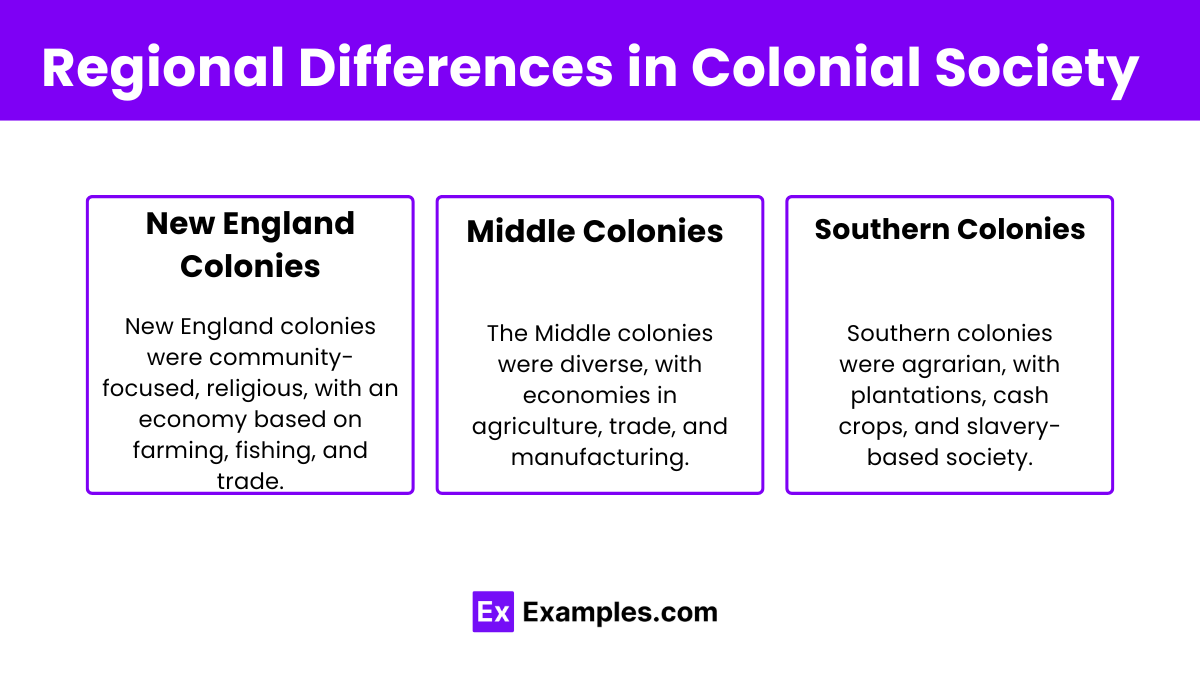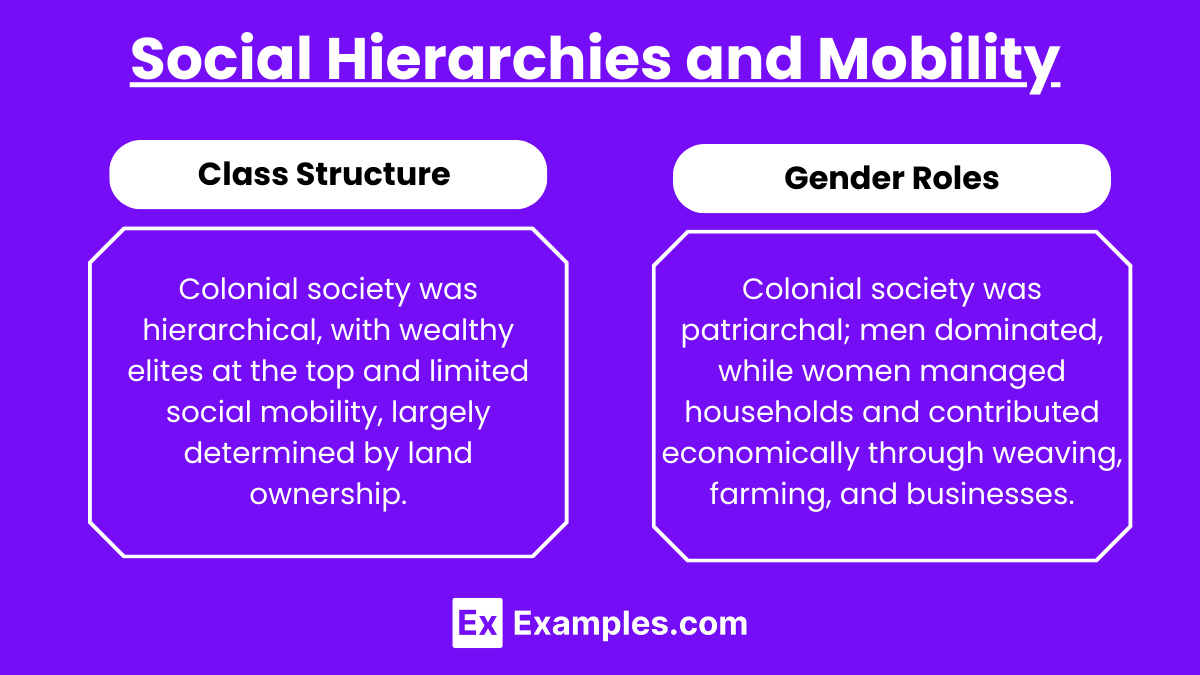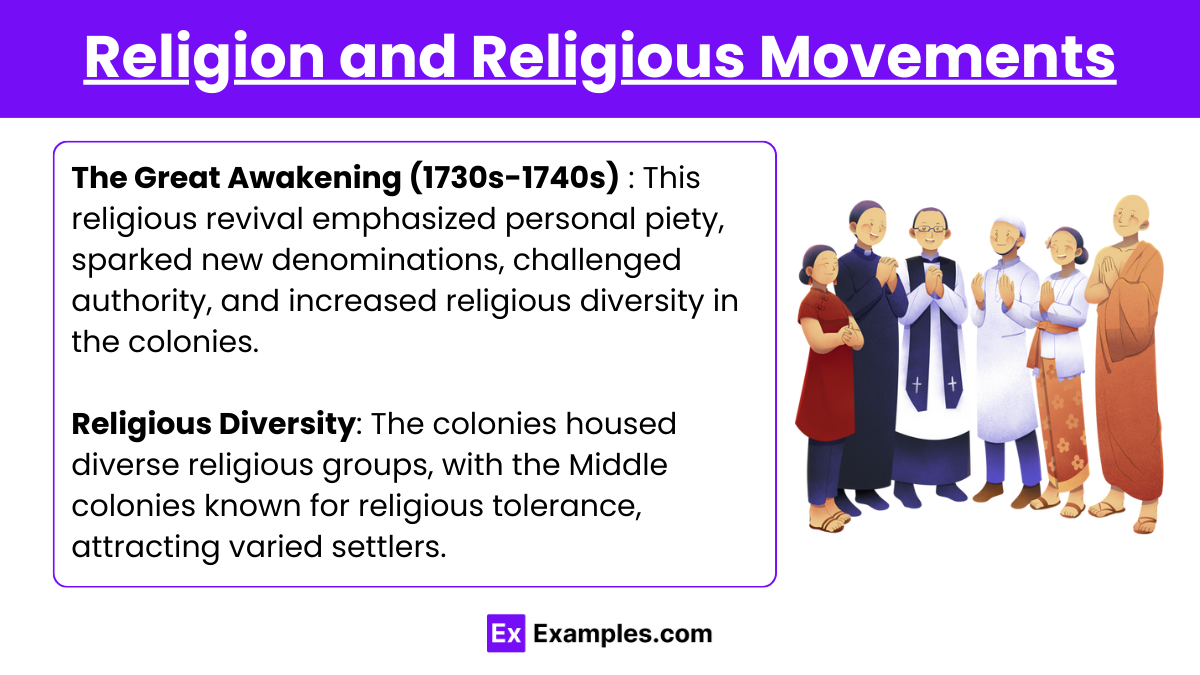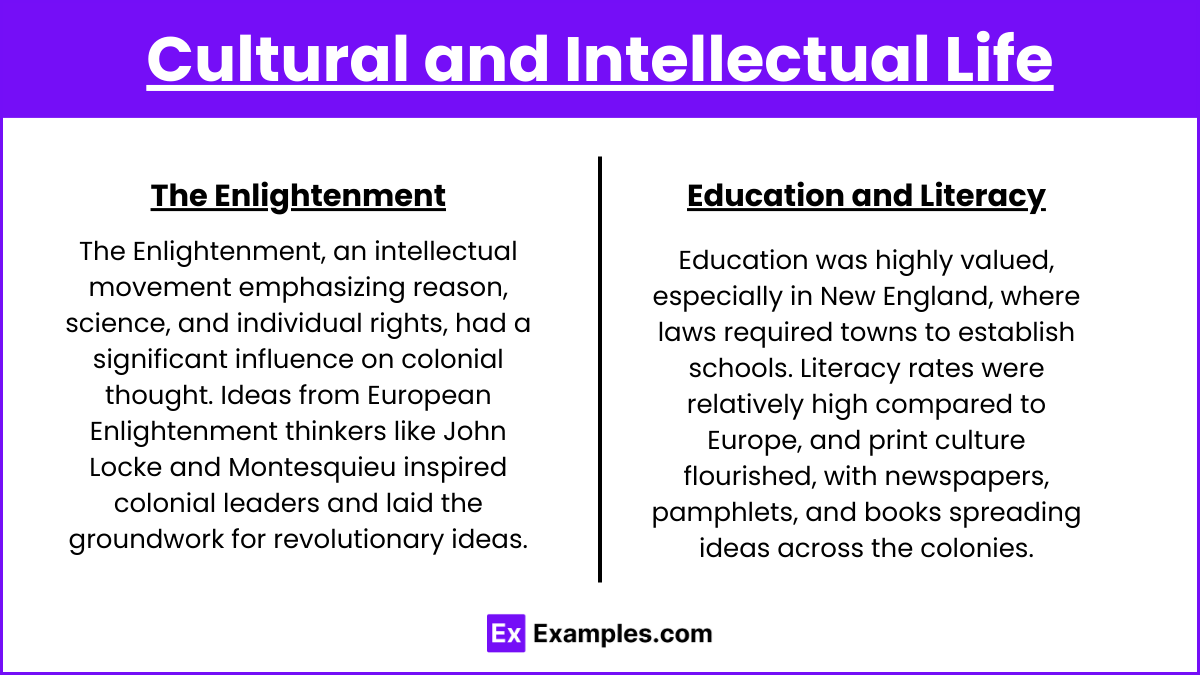In AP United States History, the study of colonial society and culture reveals the diverse and evolving nature of life in British North America. The 13 colonies developed distinct regional identities shaped by economic activities, social hierarchies, and religious practices. Cultural and intellectual movements like the Enlightenment and the Great Awakening played pivotal roles in shaping colonial thought. As colonists navigated their relationships with Native Americans, Africans, and European powers, a unique American identity began to emerge, laying the foundation for the revolutionary period.
Learning Objectives
In studying colonial society and culture, you will be introduced to the regional differences among the New England, Middle, and Southern colonies. The social hierarchies, economic systems, and religious practices that defined colonial life will be explored. You will examine the impact of cultural and intellectual movements, such as the Enlightenment and the Great Awakening, on colonial thought. Additionally, the development of self-governance and the emergence of a distinct American identity will be analyzed.
Regional Differences in Colonial Society

New England Colonies: The New England colonies (Massachusetts, Connecticut, Rhode Island, and New Hampshire) were characterized by small towns, a focus on community and religion, and an economy based on farming, fishing, and trade. Puritanism played a central role in shaping the culture and social structure, emphasizing education and civic responsibility.
Middle Colonies: The Middle colonies (New York, New Jersey, Pennsylvania, and Delaware) were known for their diversity in terms of ethnicity, religion, and economic activities. These colonies were a melting pot of different cultures, with economies based on agriculture, trade, and manufacturing.
Southern Colonies: The Southern colonies (Maryland, Virginia, North Carolina, South Carolina, and Georgia) were primarily agrarian, with large plantations growing cash crops like tobacco, rice, and indigo. The reliance on slavery as a labor source shaped the social hierarchy and cultural practices of the region.
Social Hierarchies and Mobility

Class Structure: Colonial society was hierarchical, with a small elite of wealthy landowners and merchants at the top, followed by middling farmers, artisans, and laborers. At the bottom were indentured servants and enslaved Africans. Social mobility was possible but limited, with land ownership being a key determinant of status.
Gender Roles: Colonial society was patriarchal, with men holding most of the power in both public and private spheres. Women were primarily responsible for household management and child-rearing, although they also contributed to the economy through activities like weaving, farming, and running businesses in the absence of men.
Religion and Religious Movements

The Great Awakening (1730s-1740s): This religious revival movement swept through the colonies, emphasizing individual piety and emotional religious experiences. It led to the growth of new denominations, challenged established religious authorities, and encouraged greater religious diversity.
Religious Diversity: The colonies were home to a wide variety of religious groups, including Puritans, Quakers, Anglicans, Catholics, and Jews. The Middle colonies, in particular, were known for their religious tolerance, which attracted settlers from various backgrounds.
Cultural and Intellectual Life

The Enlightenment: The Enlightenment, an intellectual movement emphasizing reason, science, and individual rights, had a significant influence on colonial thought. Ideas from European Enlightenment thinkers like John Locke and Montesquieu inspired colonial leaders and laid the groundwork for revolutionary ideas.
Education and Literacy: Education was highly valued, especially in New England, where laws required towns to establish schools. Literacy rates were relatively high compared to Europe, and print culture flourished, with newspapers, pamphlets, and books spreading ideas across the colonies.
Political Culture and Governance

Colonial Assemblies: Each colony had its own elected assembly, which played a crucial role in local governance. These assemblies controlled taxation and expenditures and served as a training ground for future American leaders. The development of colonial assemblies laid the foundation for representative government.
Salutary Neglect: For much of the colonial period, Britain practiced “salutary neglect,” allowing the colonies considerable autonomy in managing their affairs. This relative independence fostered a sense of self-governance and contributed to the development of a distinct colonial identity.
Examples
Examples : 1
The Mayflower Compact (1620): An early example of self-government in the New England colonies, the Mayflower Compact was an agreement among the Pilgrims to establish a government based on majority rule, setting a precedent for later democratic governance.
Examples : 2
The First Great Awakening: This religious revival movement emphasized personal faith and piety, leading to the growth of evangelical denominations and challenging the established religious order in the colonies.
Examples : 3
Pennsylvania’s Religious Tolerance: Founded by William Penn, Pennsylvania became a model of religious tolerance, attracting Quakers, Mennonites, Lutherans, and other religious groups, which contributed to the colony’s diversity and prosperity.
Examples : 4
The House of Burgesses (1619): The first elected legislative assembly in the American colonies, established in Virginia. The House of Burgesses served as a model for representative government and played a key role in the development of democratic practices in the colonies.
Examples : 5
The Zenger Trial (1735): The trial of John Peter Zenger, a New York printer, for libel against the colonial governor. Zenger’s acquittal established a precedent for freedom of the press in the colonies, highlighting the growing importance of individual rights.
Multiple Choice Questions (MCQs)
What was the primary economic activity in the Southern colonies?
A. Manufacturing
B. Trade
C. Plantation agriculture
D. Shipbuilding
Answer: C
Explanation: The Southern colonies’ economy was primarily based on plantation agriculture, with cash crops like tobacco, rice, and indigo driving the demand for labor, particularly enslaved labor.
Which intellectual movement emphasized reason, science, and individual rights, influencing colonial leaders and ideas?
A. The Great Awakening
B. The Enlightenment
C. The Protestant Reformation
D. The Counter-Reformation
Answer: B
Explanation: The Enlightenment was an intellectual movement that emphasized reason, science, and individual rights. It significantly influenced colonial leaders and contributed to the development of revolutionary ideas.
What was a key feature of the Great Awakening in the colonies?
A. It increased the power of established churches.
B. It led to the decline of religious diversity.
C. It encouraged emotional religious experiences and challenged traditional authority.
D. It was primarily focused on social and political reform.
Answer: C
Explanation: The Great Awakening encouraged emotional religious experiences and challenged traditional religious authority, leading to the growth of new denominations and greater religious diversity in the colonies.

